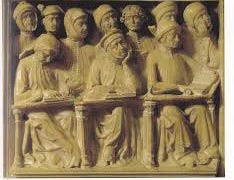A previous reading list gave some recommendations for those interested in the classical legal tradition. But there are indefinitely many such books, even if we count only the essential reading. (This is of course the scholar’s joy, and curse). So here’s another installment in the continuing series:
Joseph F. O’Callaghan, Alfonso X, The Justinian of His Age: Law and Justice in 13th-Century Castile. An essential introduction to one of the greatest works of Western law - see the next entry… But this is a clear, engaging and instructive book in its own right.
Las Siete Partidas, translated (in five volumes) by Samuel Parsons Scott, and edited by Robert Burns, S.J. The great creation attributed to Alfonso the Wise (surely with the aid of his jurists): a book of the law in seven parts. It’s hard to know what to even call this superb work. It’s a “law code,” except that in places it’s more discursive than any code, and filled with evocative ideas and passages that provide endless food for thought (e.g. “sovereignty needs no companions”). Cannot be recommended highly enough.
Charles O. Hucker, The Censorial System of Ming China. A famous study of one of the most fascinating of the classical legal-administrative institutions of China. For U.S. lawyers: imagine something like a professional corps of inspectors-general with sweeping authority to ferret out incompetence or malfeasance.
Brian McCall, The Architecture of Law: Rebuilding Law in the Classical Tradition (Notre Dame University Press, 2018). We were pleased to host Professor McCall this week, and highly commend his tour d’horizon of the classical legal tradition, especially for those mainly interested in the theological and philosophical side of the tradition. (The book is less interested in the civilian side of the tradition).
Martin Loughlin, The Foundations of Public Law (Oxford University Press, 2010). Professor Loughlin is not a natural lawyer but writes very perceptively about how most of the basic grammar and vocabulary of contemporary Western public law thought - concepts like authority, power, sovereignty, office, jurisdiction, rights - are concepts whose roots lie in a rich mixture of Roman law, canon law, and theology, that form the classical legal tradition. The opening chapters are worth reading to see Loughlin unfold this argument. The latter chapters are, for the classical jurist, a good reminder of how a good deal of the rich ontology of this tradition has been whittled away in contemporary legal thought.
TRS Allan, The Sovereignty of Law (Oxford University Press, 2013). Trevor Allan is a leading voice within British constitutional law. His theory of common law constitutionalism is infused with classical principles of just authority and the intrinsic connection between law and morality. This book represents the culmination of decades of thinking on themes and questions central to constitutionalism. While Professor Allan approaches this from within a liberal framework, it is one which is thoroughly infused with classical principles.
Do you, perhaps, suffer from the mistaken view that an active administrative state, justified by reference to the general welfare, was a creation of the 20th century? Of Woodrow Wilson? (Did you hear all this at the Federalist Society?) If so, please read, right now, William J. Novak, The People’s Welfare: Law and Regulation in 19th-Century America. Cheers!




